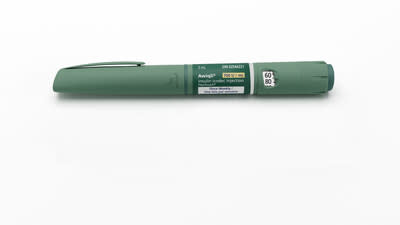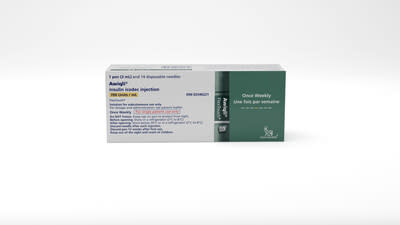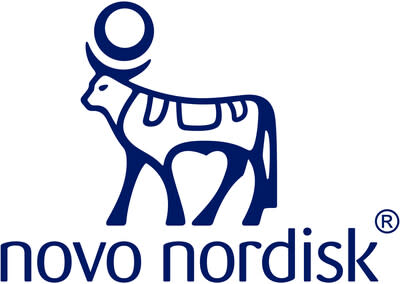Awiqli® - world's first once-weekly basal insulin - now available in Canada
Awiqli® provides convenient once-weekly dosing1
Health Canada approval based on safety and efficacy data from the ONWARDS clinical trial program1
MISSISSAUGA, ON, June 17, 2024 /CNW/ - Novo Nordisk is pleased to announce Canada will be the first country worldwide to launch Awiqli® (insulin icodec injection), which will be available across the country starting June 30, 2024. Awiqli® is the world's first once-weekly basal insulin and is indicated for the treatment of adults with diabetes mellitus to improve glycemic control.1 Health Canada approved Awiqli® on March 12, 2024.1
"The arrival of Awiqli® in Canada marks a pivotal moment in over 100 years of diabetes care. By transitioning from daily basal insulin injections to just one per week, Awiqli®'s convenience ultimately provides the choice for potentially more patients living with diabetes in need of basal insulin to better manage their condition," said Dr. Alexander Abitbol, MDCM, FRCPC, Endocrinologist & Assistant Medical Director, LMC Healthcare, Lead Primary Investigator - Early Phase, Centricity Research.
Type 2 diabetes (T2D) is a progressive disease requiring treatment intensification over time. Rates of diabetes are rising, resulting in increased human and economic costs that affect individuals, communities, healthcare systems and societies.2 Over 4.1 million Canadians are living with diagnosed diabetes,3 and may face the burden of daily injections.4,5 This can be a major barrier to insulin adherence among those living with diabetes.4,5 Despite ongoing advancements in diabetes treatments, there is still a significant gap in diabetes care, with half of all adults with type 2 diabetes remaining undiagnosed and many unable to achieve their glycemic targets.6,7
Survey of Canadians living with T2D8
A majority (58%) of Canadians living with type 2 diabetes who take insulin surveyed feel managing their diabetes with daily insulin injections is a burden and 55% feel taking insulin every day is challenging.
Over three-quarters (77%) of Canadians living with type 2 diabetes who take insulin surveyed are interested in an insulin choice with a less frequent (than daily) administration regime, and a majority (65%) wish their daily insulin routine was easier.
Similarly, over half (57%) of those who do not take insulin would welcome an insulin therapy if it was less frequent. Two-in-five (43%), agree that daily insulin injections would limit things they'd like to do in life – e.g., travel more.
About Awiqli®
Novo Nordisk received regulatory approvals for once-weekly basal insulin icodec in Switzerland and Canada in March 2024 for the treatment of both type 1 diabetes and type 2 diabetes in adults, followed by approval by the European Commission (EC) in May 2024.
Health Canada approved Awiqli® (insulin icodec injection) in March 2024, as a once-weekly treatment for adults with diabetes mellitus to improve glycemic control based on data from the phase 3a ONWARDS clinical trial.1 The ONWARDS phase 3a trial program for once-weekly basal insulin icodec comprises six phase 3a global clinical trials, including a trial with real-world elements, involving more than 4,000 adults with type 2 or type 1 diabetes. All trials met their primary endpoints.1
Hypoglycemia (too low blood sugar) is the most common adverse reaction of all insulin preparations, including Awiqli®. The most common side effects reported include hypoglycemia, skin problems where the injection is given such as bruising, bleeding, pain or discomfort, redness, swelling or itching, and peripheral oedema (swelling especially of the ankles and feet due to fluid retention).1
About T2D Survey8
Leger survey of 1,000 Canadians, 18+, living with T2D who are either using first-line therapies or insulin to manage their disease or who have discussed insulin therapy with their HCPs but have not started on insulin. Completed between April 23 and May 5, 2024, using Leger's online panel. No margin of error can be associated with a non-probability sample (i.e. a web panel in this case). For comparative purposes, though, a probability sample of 1,000 respondents would have a margin of error of ±3.1%, 19 times out of 20.
About Novo Nordisk
Novo Nordisk is a leading global healthcare company, founded in 1923 and headquartered in Denmark. Our purpose is to drive change to defeat serious chronic diseases, built upon our heritage in diabetes. We do so by pioneering scientific breakthroughs, expanding access to our medicines, and working to prevent and ultimately cure disease. Novo Nordisk employs about 63,400 people in 80 countries and markets its products in around 170 countries. For more information, visit novonordisk.ca, Facebook, Instagram, LinkedIn and YouTube.
________________________________ |
1 Novo Nordisk Canada Inc. (2024, March 12). Awiqli® Product Monograph. https://www.novonordisk.ca/content/dam/nncorp/ca/en/products/awiqli-en-product-monograph-12-march-2024.pdf |
2 Public Health Agency of Canada. (2022, October 5). Framework for diabetes in Canada. https://www.canada.ca/en/public-health/services/publications/diseases-conditions/framework-diabetes-canada.html |
3 Diabetes Canada. (2022, March 3). Diabetes rates continue to climb in Canada. https://www.diabetes.ca/media-room/press-releases/diabetes-rates-continue-to-climb-in-canada |
4 Peyrot M, Barnett AH, Meneghini LF, et al. Insulin adherence behaviours and barriers in the multinational Global Attitudes of Patients and Physicians in Insulin Therapy study. Diabet Med. 2012; 29:682–689. |
5 LAI 287 Prescription and Preference Driver 2019. Base: All patients (n = 391). Markets: USA, UK, France, Germany, China and Japan. |
6 International Diabetes Federation. IDF Diabetes Atlas (10th edition). https://diabetesatlas.org/ |
7 Menon AS, Ahluwalia AI. The ABC of diabetes. How many patients are able to achieve the goal laid down by American Diabetes Association? Med J Armed Forces India. 2015;71:132–134. |
8 Novo Nordisk T2D Survey, Commissioned by Leger. Completed between April 23rd and May 5th, 2024, using Leger's online panel. |
SOURCE Novo Nordisk Canada Inc.

View original content to download multimedia: http://www.newswire.ca/en/releases/archive/June2024/17/c4784.html

 Yahoo Finance
Yahoo Finance 


